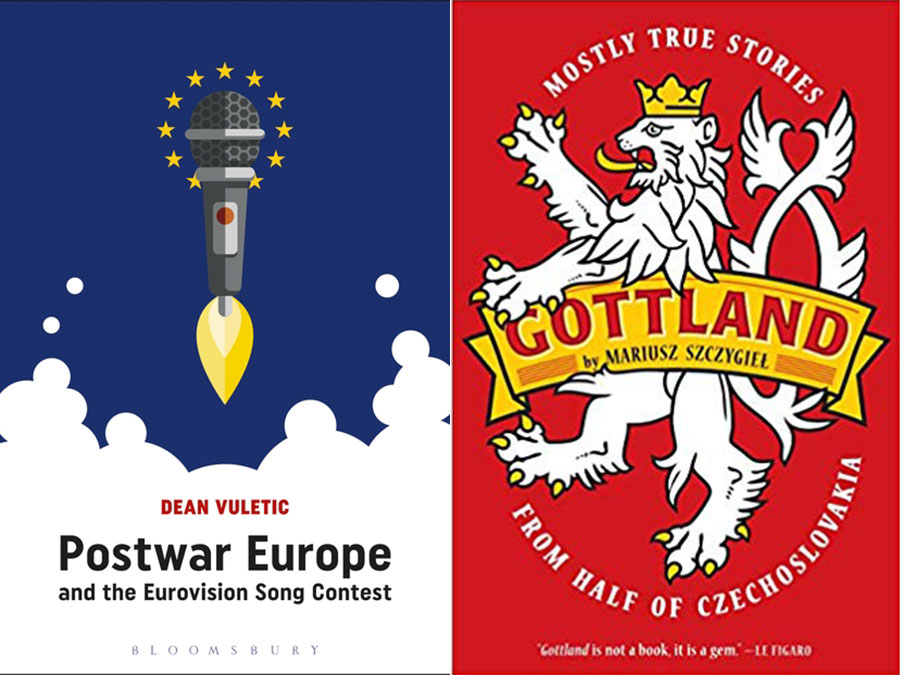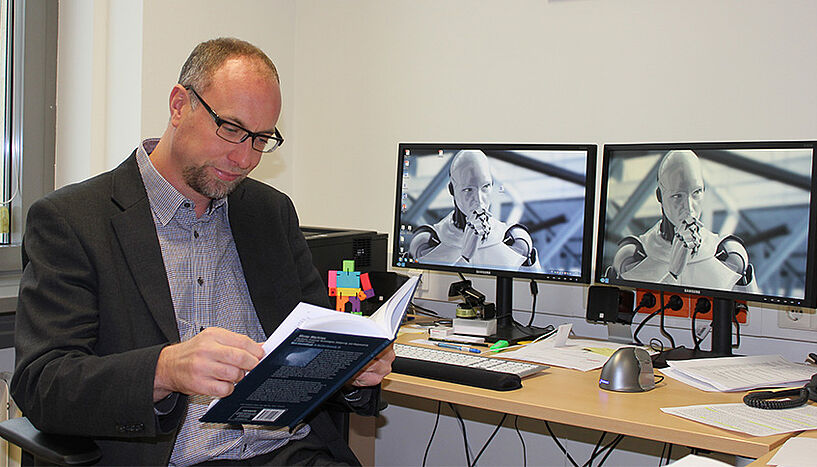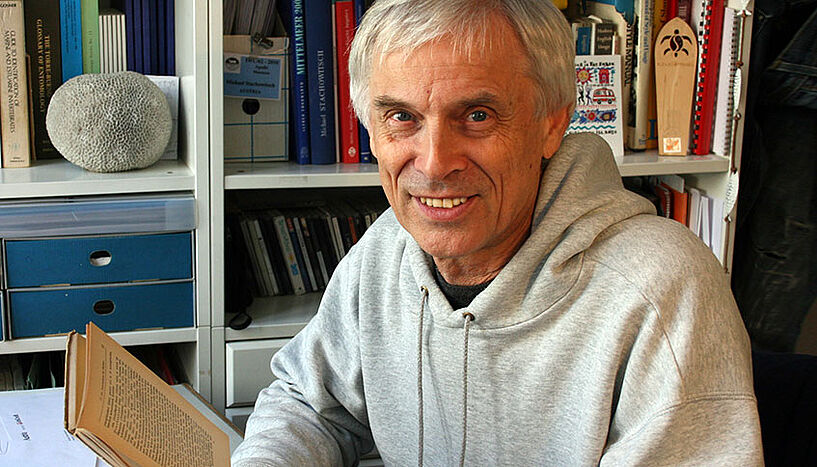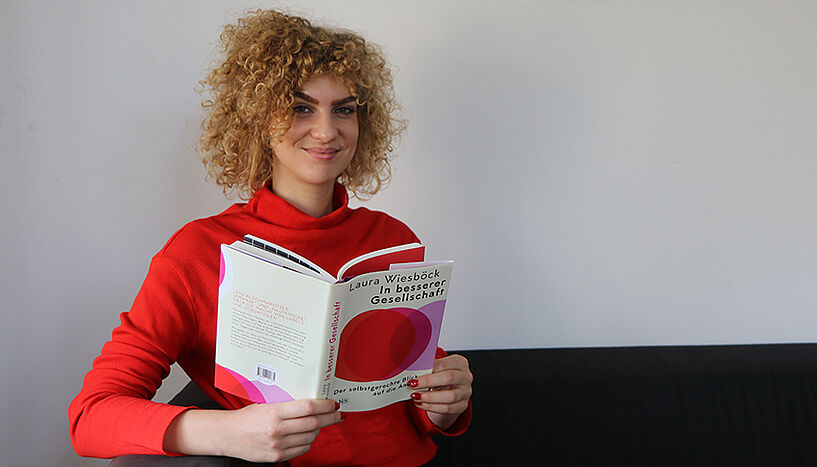"Buchtipp des Monats" by Dean Vuletic
| 10. Januar 2019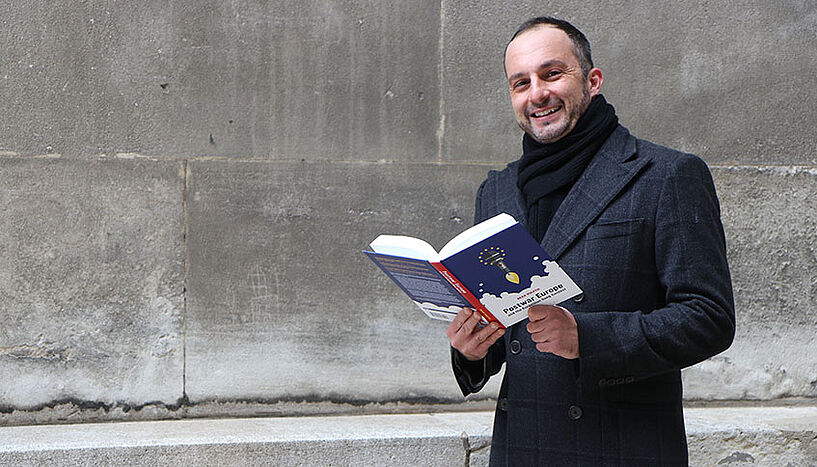
The historian Dean Vuletic with his latest publication "Postwar Europe and the Eurovision Song Contest". (© University of Vienna)
The Eurovision Song Contest has always had a political and social impact, not only since Conchita Wurst. In his monograph the historian Dean Vuletic takes a closer look and analyses Postwar Europe and the ESC.
uni:view: In your latest publication "Postwar Europe and the Eurovision Song Contest" you use the Eurovision Song Contest (ESC) as a tool to explain the history of Europe in the last sixty years. How did you get the – at first sight unusual – Idea?
Dean Vuletic: I began watching the ESC as a child growing up in Australia. I first wrote an essay about the politics of the ESC as an undergraduate student specialising in European studies at the Australian National University. In 1999 I attended my first ESC in Jerusalem while I was studying at the Hebrew University. I began researching the ESC for my doctoral dissertation on popular music and politics in Yugoslavia, and while doing research in Belgrade in 2007, I watched Serbia win the contest. So the ESC seemed to follow me in my academic career, and wherever I went people always had an opinion about it. After finishing my doctorate I taught for the New York University and developed the world’s first university course on the history of the ESC and what it tells us about the politics of postwar Europe. Yet, despite it being one of Europe’s greatest popular cultural phenomena, there was still no academic monograph on the history of the ESC. So I decided to write one.
uni:view: The ESC is often seen as cultural kitsch at the same time it is one of the most popular television programmes in Europe. How come?
Vuletic: While the ESC has had many entries that could be described as cultural kitsch, I demonstrate in my book that there have also always been artists and songs in the contest that have been politically and socially engaged. And I think that this is one of the reasons why the contest is so popular, because the viewing audience likes to interpret the contest, and especially its voting results, from a political perspective.
Sorry, already drawn! You can find the books also in the Vienna University Library:
1 x "Postwar Europe and the Eurovison Song Contest" by Dean Vuletic
1 x "Gottland: Mostly True Stories from Half of Czechoslovakia" by Mariusz Szczygieł
uni:view: In what way is the ESC political?
Vuletic: The ESC is political not only because entries in it have made statements about political and social issues, but also because these entries represent states. That means that the contest has always been a performance of international relations. The entries are submitted by national public service broadcasting organisations, but the entries, and the voting results, are presented under the names of states.
uni:view: What are the most interesting winners over the last years in your personal opinion?
Vuletic: I think that, since the victory of Austria’s bearded drag queen Conchita Wurst in the 2014 ESC, most of the winners have been interesting because they have sought to make some political or social statement. The Ukrainian, Portuguese and Israeli entries that have won the ESC in recent years have respectively highlighted the issues of Crimea’s history, linguistic diversity and the Me Too movement. The irony of this succession of winners is that the organiser of the ESC, the European Broadcasting Union, has sought to make the contest less politicised in order to protect its commercial brand. But, as I said earlier, I think that the viewing audience wants to see entries that have a political and social resonance and are not just cultural kitsch.
uni:view: Which book do you recommend?
Vuletic: My recommendation is the book "Gottland: Mostly True Stories from Half of Czechoslovakia" by the Polish journalist Mariusz Szczygieł. It won the European Book Prize in 2009.
uni:view: Some thoughts on this book?
Vuletic: "Gottland" tells Czech history in the twentieth century through the biographies of famous Czechs, mostly artists, and their experiences under different political regimes. One of them is Karel Gott, the most famous Czech singer who is popular throughout Central Europe and who even represented Austria in the 1968 ESC, which was politically symbolic considering that that was the time of the Prague Spring. Gottland has been an inspiration for my current research project on the Intervision Song Contest, the Eastern European equivalent of the ESC that was staged in Czechoslovakia and Poland during the Cold War.
uni:view: You have read the last sentence, close the book. What remains?
Vuletic: The need for Europeans to understand their neighbours better. Gottland is, after all, a book about Czechs written by a Pole but, as the author notes at the end of the English edition, it is "a European’s book about Europe". Even though the Cold War ended almost thirty years ago and despite the experience of European integration, Europeans still need to overcome engrained prejudices, especially those about Eastern Europe. West European media commentaries about the ESC, for example, still like to accuse Eastern Europeans of biased voting in the contest despite this not being exactly true: the Czech Republic, for example, has never benefitted from such a voting bloc. And that’s just a small reflection of the suspicions that remain between East and West in Europe. (td)
Dean Vuletic is a historian of contemporary Europe working in the Department of East European History at the University of Vienna. He is the author of "Postwar Europe and the Eurovision Song Contest", the first scholarly monograph on the history of the ESC, which he produced as a Marie Skłodowska-Curie Intra-European Fellow. As a Lise Meitner Fellow, he currently leads the research project "Intervision: Popular Music and Politics in Eastern Europe".

